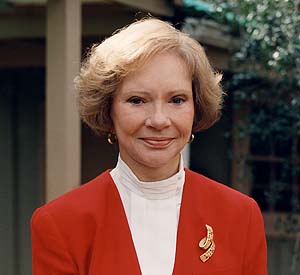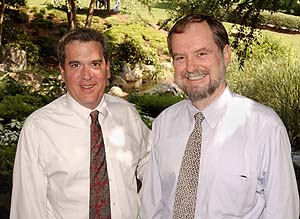|
"An Illness Like Any Other"
Jay Neugeboren, Robert’s older brother and caretaker, is an award-winning author who wrote, Imagining Robert: My Brother, Madness, and Me. The relationship between the brothers—one of both genuine affection and long-standing tensions—caught the attention of filmmaker Larry Hott, who wanted to portray the impact that a severe and enduring mental illness has on a family. The resulting documentary, Imagining Robert, has been shown at public screenings around the country, and it has received the 2003 National Mental Health Association Media Award. The documentary also has a corresponding study guide for use in the classroom. “This is a true story––true not only for the protagonists, but for millions of other Americans,” says Hott, who received a $10,000 grant toward the film project as one of eight Rosalynn Carter Fellowships for Mental Health Journalism awarded in 2001. “The stigma, shame, and secrecy that accompany mental illness invariably isolate these individuals and their families, so their stories remain invisible. We want people to start talking about this issue.”
Mental health is public health
To that end, in collaboration with the Rollins School of Public Health (RSPH), the center has established the first endowed chair of mental health in a school of public health in the country. Stan Jones, a member of the RSPH Dean’s Council and a mental health lawyer who worked with Carter for years as a volunteer, says the chair will bring needed attention to mental health policy. Atlanta mental health advocate Beverly Benson Long initiated the drive and provided the seed money for the Rosalynn Carter Chair of Mental Health. “The first point was to honor Mrs. Carter and her work in mental health. The second was to balance the scales between treatment and prevention,” says Long, former president of both the state and national mental health associations. “I would like to see a mental health chair in every public health school in the country.” Benjamin Druss, a psychiatrist and internist recruited from Yale, was named the first Rosalynn Carter Chair of Mental Health at RSPH in December 2002. Druss works mostly at the policy level, focusing on research that creates models for incorporating mental health care into primary care settings. “Ben Druss embodies the integration we’re seeking,” says Thomas Bornemann, director of The Carter Center Mental Health Program. “One of our biggest challenges is moving findings into policy and practice.” For instance, research has shown that most people with a mental illness go to their primary care physician instead of seeking a specialist such as a psychiatrist. But busy internists or family practitioners often lack the time or inclination to diagnose a mental disorder and provide appropriate treatment, referral, and follow-up care, according to Druss. For example, if a patient comes in complaining of difficulty sleeping, a headache, or a stomachache, Druss says, there is approximately a 50/50 chance that his doctor will raise the possibility of depression. “The symptoms can be subtle and doctors don’t have as much time to get to know their patients anymore,” says Druss, who is exploring better screening methods. “Primary care at its best involves seeing the big picture and feeling a sense of responsibility to be an overall advocate for the patient.”
Fragmented Care “The US mental health system is badly fragmented,” Druss says. “There’s a lot of good research about how to change care at the clinical level and treatments that work, as well as a real effort by the research community and the broader policy community to translate research to practice. But even the best efforts to do this won’t work if they’re occurring in a hostile environment.” With reduced services and lack of affordable medications for those with mental illness, staff in jails and emergency rooms are becoming the de facto providers of mental health care.
“Navigating through the health care system is a challenge for anyone,” he says, “let alone someone with a mental illness.”
Ending Discrimination “We know we can be effective in treating most mental disorders,” Bornemann says. “We know that it saves money to treat mental illnesses early. Yet, most people who need mental health care still don’t get it. Parity is no longer an issue simply of fairness as much as a matter of ending blatant discrimination for which there is no logical rationale.” Just take a look, he says, at the words that are still used to describe those with mental illnesses—crazy, psycho, loony, insane. “Demeaning terms are no longer socially acceptable when describing other disabilities. Why are they still applied to those with a mental illness?” Through events such as the Rosalynn Carter Georgia Mental Health Forum and the national Rosalynn Carter Symposium on Mental Health Policy, The Carter Center invites mental health experts, policy makers, and those with mental illnesses to come together, discuss pressing issues, and take action. “Mental health organizations never all agree on anything—but they will all come here,” Rosalynn Carter says. Past symposia topics have included mental illness and the elderly, families at risk, reducing disparities, youth in crisis, and mental health needs in the wake of the September 11th terrorist attacks. In the annual Conversations series, celebrities such as actor Rod Steiger and writer Kathy Cronkite, daughter of Walter Cronkite, have spoken about their own experience with clinical depression. “It turns out the Unabomber and I take the same medication,” said Cronkite, speaking about ways that negative publicity can frighten people away from taking anti-depressants that might save their lives. “We need to educate the public about the facts. For me, the diagnosis of depression was a great relief. . . . Normal is the most glorious thing there is.”
A shared vision “Mrs. Carter and I share a vision for mental health in the country that centers on parity of access to mental health services in our health care system and the need to erase the fear and stigma against mental illnesses,” says Satcher, the first Surgeon General to focus on mental health in his 1999 report. When Rosalynn Carter was growing up in Plains, Georgia, she had her first encounter with someone with a mental illness: a loud, nervous young man—a cousin of her future husband, Jimmy Carter—who would sometimes be handcuffed or put in a straightjacket and taken to a state mental institution. There were few options then, she says, but now, with so many breakthroughs in neurobiology, genetics, and therapies that there is cause for much optimism, budget cuts and legislative challenges notwithstanding. “As scientists learn more about the brain, they are finding that mental illness is an illness like any other,” says Carter, who proudly adds that one of her 11 grandchildren is attending graduate school to become a neuroscientist. “Let me tell you about a man I met on a street corner in Atlanta,” she said. “He was a street preacher who was 37 years old and had spent 20 years in and out of institutions. He prayed all the time that God would love everybody, even those who are mentally ill. It makes you cry to think about it. Then he got on one of the new drugs which have revolutionized mental health care. When I met him, he was just about to finish college. Those kinds of things just make you feel really good.” By Mary Loftus, a former Knight Journalism Fellow at CDC and reporter for the New York Times, and associate editor of Emory Magazine.
Resisting Superbugs | Foege Fellows | Cancer Collaboration | Profile: County Connections Class Notes & Alumni News | Rollins School of Public Health
Copyright © Emory University, 2003. All Rights
Reserved. |




